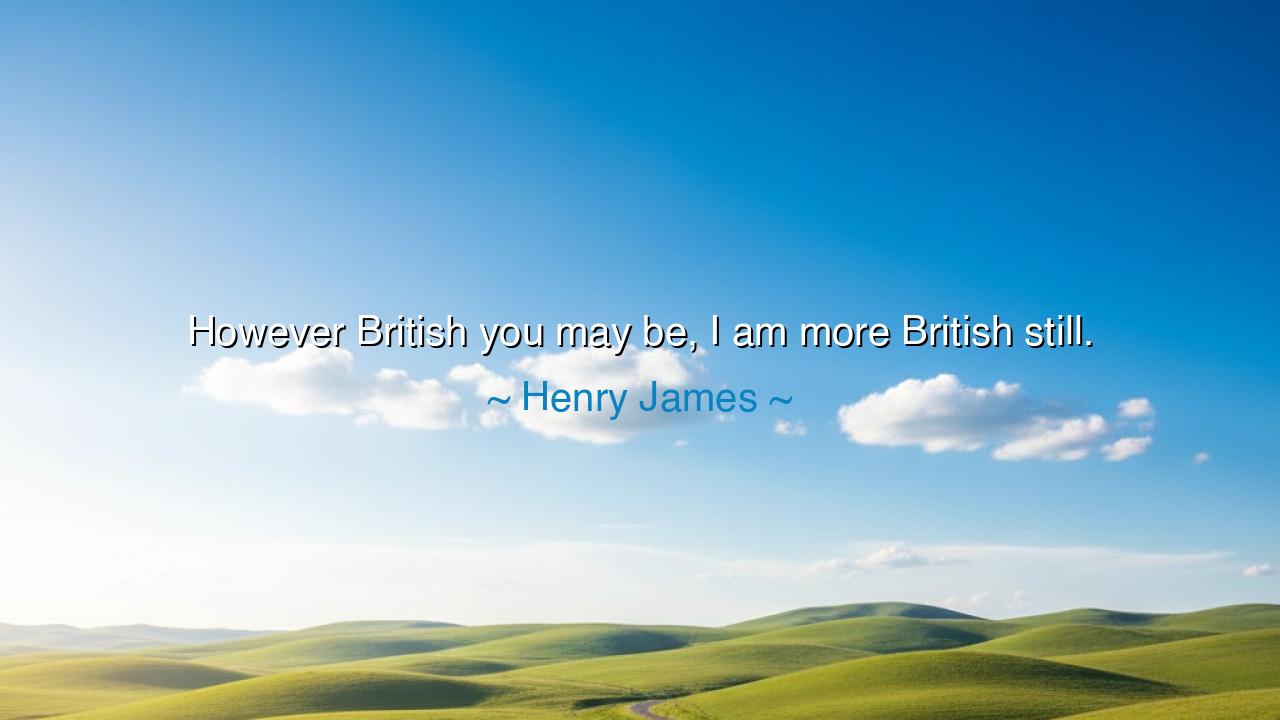
However British you may be, I am more British still.






Henry James, that master of words who bridged the Old World and the New, once declared: “However British you may be, I am more British still.” In these words, there is at once pride and irony, devotion and defiance. For here speaks not merely a man, but a soul wrestling with belonging. Born an American, James gave his pen, his heart, and at last even his citizenship to Britain. His cry is not of blood, but of spirit. He shows us that identity is not always inherited; sometimes it is chosen, forged in the fire of love and loyalty.
The meaning is layered. On the surface, James sought to prove his devotion to Britain, a land not of his birth but of his adoption. His words carried the fervor of one who loved a nation so fiercely that he sought to outdo even those who had never questioned their place within it. To be British, in his sense, was not only to live under the flag, but to embody the culture, the manners, the traditions, the very soul of the island kingdom. In claiming to be “more British still,” James expressed the truth that the truest patriot is not always the one who is born into a people, but the one who chooses them with heart and conviction.
History bears witness to such transformations. Consider the story of Marcus Aurelius’ general, Claudius Pompeianus. He was not Roman by blood, but a Syrian by birth. Yet he so loved Rome, so served her cause with valor and loyalty, that emperors trusted him above men born of the Seven Hills. He became more Roman than many Romans. Likewise, Henry James, though born of America, clothed himself in Britishness so completely that he surpassed even the natives in his devotion. Such is the paradox of chosen identity: it is often fiercer, sharper, and more enduring than that which is inherited.
Yet James’s words are not merely about Britain; they are about the power of allegiance. They remind us that the heart may attach itself to a place, a people, or a cause more deeply than the accident of birth would suggest. In this, his statement is both heroic and tragic, for it shows the weight of yearning—the desire to belong, to be recognized, to have one’s love accepted. In saying “more British still,” James was also saying, “see me, acknowledge my devotion, for I have given you all.” Such is the plight of many who adopt new lands, new causes, or new identities: they must prove themselves doubly, striving to show that their loyalty is not less but greater.
The lesson for us is profound. Identity is not a prison, locked at birth. It is a river, shaped by the lands through which it flows. We are not bound solely to what we inherit; we may choose, we may dedicate, we may commit ourselves anew. Whether to a nation, a community, or a cause, our truest belonging is not in the accident of our beginnings, but in the constancy of our devotion. Thus, we should ask ourselves not only, “Where am I from?” but also, “To what have I given my heart?”
In our own lives, let us follow James’s example, but temper it with wisdom. If you have adopted a land, honor it with loyalty, yet do not despise the soil from which you first sprang. If you have chosen a cause, serve it with diligence, and let your service be seen not in boasts but in deeds. For the world respects not empty words, but the proof of devotion lived daily. To be ‘more British still,’ or more anything still, is not to shout louder, but to serve more faithfully.
Therefore, carry this teaching forward: you are not forever chained to where you began, but you are responsible for what you become. The truest patriotism—whether to a nation or to a cause—is not in birthplace, but in the blood, sweat, and spirit you are willing to pour out. And when your devotion is tested, let your deeds declare, as Henry James did in words: “However you may be, I am more still.”






AAdministratorAdministrator
Welcome, honored guests. Please leave a comment, we will respond soon